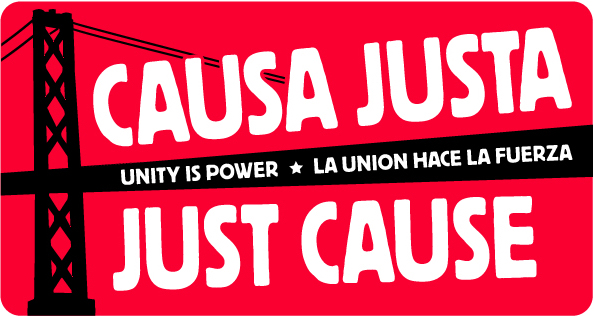
Attendees at Saturday’s tenant convention placed stickers marking where they live on a map of San Francisco that displayed average housing prices. Photo by Lynne Shallcross
By Lynne Shallcross/MISSION L@CAL
Posted November 25, 2013 4:00 pm
Sergio Lainez is fighting to keep his family of five in the only home they’ve known for the past 22 years on Bryant and 24th streets. “I don’t have peace at all,” said Lainez, 41, who, with the help of the Tenderloin Housing Clinic, has been in a five-year legal battle with his landlord. “They just want me out.”
Lainez joined a group of about 50 other Mission and Excelsior residents Saturday at Everett Middle School for a tenant convention organized by Just Cause (also known as Causa Justa.) The event was intended to be the first step in getting a measure to fight displacement on next fall’s citywide ballot.
Wading through topics including accountability for landlords who neglect repairs, reducing the impact of the Ellis Act and protections against evictions and vacancy control, attendees talked about what they want to see turned into a ballot measure.
“It’s going to be a pretty long fight next year, and we want people to invest in it and feel a part of it — and the way that we see that being a possibility is if they craft it, if they’re involved from the very beginning,” said Maria Zamudio, San Francisco Housing Rights Organizer for Just Cause.
Just Cause was part of a larger coalition last year that worked successfully to pass a bond to fund affordable housing development, known as the Housing Trust Fund or Proposition C.
The San Francisco Budget and Legislative analyst reported recently that more residents were evicted from the Inner Mission with the Ellis Act than in any other neighborhood. The Ellis Act is a 1986 state law that allows landlords to take their rental properties off the market by evicting all of the tenants. The report tracked 71 Ellis Act eviction notices in the Inner Mission from 2009 to 2013.
Citywide, all types of evictions reported to the city’s Rent Board rose from 1,242 in March 2010 to 1,716 in February 2013. Evictions under the Ellis Act increased 170 percent between March 2010 and February 2013. From October 2012 to September 2013, there were 162 Ellis Act evictions.
Hebert Sipion has been living in the Excelsior District for two years, and last month, his landlord raised the amount Sipion is required to contribute to his utility charges from 80 percent of the total to 100 percent. “He told us he can raise it whatever he wants,” Sipion said.
So Sipion and his wife, who are already working with Just Cause, came to yesterday’s event to gain more information and support.
David Campos, who represents the Mission on the Board of Supervisors, reassured residents that their voices are being heard.
“The Mission is, in many respects, the front lines of this fight,” Campos told attendees. “When you have the beginning of an economic recovery where the trend is clear, it’s pretty scary because evictions are up 170 percent, but we’re talking about the beginning of this trend. So, can you imagine where we’re going to be in three months, four months, six months from now? And we know that for every eviction, there are at least two to three or perhaps even more displacements through buyouts.”
Campos said that his strategy is two-pronged. The first part is working with Assemblyman Tom Ammiano (D-San Francisco) to craft a bill that would allow local jurisdictions to make changes to the Ellis Act. “We want to see a moratorium on the Ellis Act,” Campos said.
The second part is working to combat evictions on a local level, Campos said. His local proposals include one allowing tenants to file a formal complaint with the Rent Board when they’re being harassed by landlords over buyouts, increasing the relocation costs during a buyout and possible legislation regulating buyouts.
Now that the discussion about the housing and eviction situation in the city is at the forefront, Just Cause’s Zamudio said it’s important to ask residents what they want to see change — and that happens by bringing them together, she said.
“The way that policy is often developed is our neighbors and our neighborhoods and our community members say ‘this’ is an issue,” Zamudio said. “And as policy advocates, we’re like, ‘Ok, well let me figure out if anybody has ever done anything about this and use those as models.’”
Four other meetings will happen in neighborhoods across the city, Zamudio said. Then, in January or February, Just Cause will host a citywide convention to consider the results of each neighborhood meeting and choose a proposal to move forward with.

